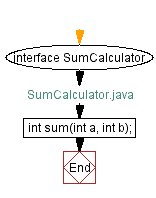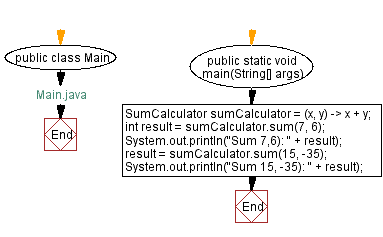Java Lambda expression - Sum of two integers
1. Sum two integers using lambda expression
Write a Java program to implement a lambda expression to find the sum of two integers.
Sample Solution:
Java Code:
// SumCalculator.java
interface SumCalculator {
int sum(int a, int b);
}
// Main.java
public class Main {
public static void main(String[] args) {
SumCalculator sumCalculator = (x, y) -> x + y;
int result = sumCalculator.sum(7, 6);
System.out.println("Sum 7,6): " + result);
result = sumCalculator.sum(15, -35);
System.out.println("Sum 15, -35): " + result);
}
}
Sample Output:
Sum 7,6): 13 Sum 15, -35): -20
Explanation:
In the above exercise, a functional interface named SumCalculator is defined. This interface has a single abstract method called sum that takes two integer parameters and returns an integer result. The lambda expression (x, y) -> x + y is used to implement this method. It takes two integers, x and y, and returns their sum.
In the main method, an instance of the SumCalculator interface is created using the lambda expression and assigned to the variable sumCalculator. For calculating the sum, the sumCalculator is invoked with pairs of integer arguments. System.out.println prints the results to the console from the result variable.
Flowchart:


For more Practice: Solve these Related Problems:
- Write a Java program to implement a lambda that adds two integers and then multiplies the result by a constant factor.
- Write a Java program to create a lambda expression that sums two integers read from a file and returns the result.
- Write a Java program to chain two lambda expressions: one for summing two integers and another for formatting the output.
- Write a Java program to implement a lambda expression that adds two integers and then subtracts a third value using function composition.
Go to:
PREV : Java Lambda Exercises Home.
NEXT : Check if a string is empty using lambda.
Live Demo:
Java Code Editor:
Improve this sample solution and post your code through Disqus
What is the difficulty level of this exercise?
Test your Programming skills with w3resource's quiz.
